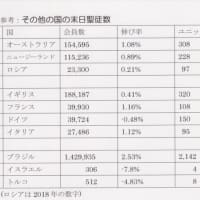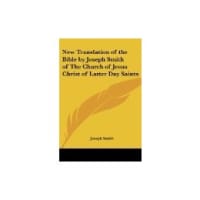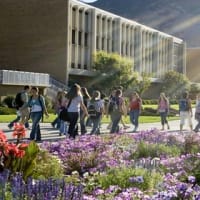聖餐式の時間の後、二名が話し、私が先に話した。
「兄弟姉妹、お早うございます。ハルピンから参加している沼
野です。ハルピン師範大学恒星学院で日本語を教え始めたところ
です。契約は1年です。
自己紹介しますと、1941年上海で生まれ、間もなく68歳になろ
うとしています。敗戦直前に弟と母に連れられて引き揚げてきて、
西宮で大きくなりました。あの引き揚げのとき、幼い子供たちが
慌ただしい帰国の途にあってやむなく取り残されて残留孤児にな
った人たちがいますが、私は人ごととは思えません。引き取って
くれた中国の人たちに日本人は恩義を受けています。こちらで年
配の中国人を見るとつい養子として育ててくれた親切な方たちを
思い出して胸が熱くなることがあります。
私は大阪外国語大学で中国語を学び、中国語にも中国人にも親
近感を抱いています。経歴としてはブリガムヤング大学での教育
(言語学)のおかげで30年英語の教師をしてきました。4人の子
供たちのうち3人が伝道に出、11人の孫がいます。
今日の話の題は啓示ということです。教会でよく知られている
ように、また最近上海地方部大会でオークス長老が話されたよう
に、啓示には二つの場合があります。ひとつは指導者を介して与
えられるもの、もうひとつは個人が私的な事柄について与えられ
る場合です。啓示は人が得ている情報が多ければ多いほど啓示は
具体的で、的確かつ深淵なものとなると理解しています。「啓示」
とは一般的に「今まで気付かなかったこと、知らなかったことが
知らされる」ことも意味します。それは人が置かれた環境や受け
る準備の程度によって異なってきます。
パウロの「ユダヤ人にはユダヤ人のように」(Iコリ9:20)とい
う言葉に従って、私はなるべく中国人のように振舞おうと努力し
ています。例えば町で移動するときはバスに乗り、学生食堂で学生
たちと食べるようにしています。目的はパウロのように彼らを得よ
うとするのではなく、草の根レベルで彼らを理解しようとすること
にあります。人々を理解することは人々を愛する第一歩の段階であ
り、不可欠な条件です。私は中国にいて「荒野」にいるようには感
じません。もし周りで聞こえる言葉や目にする振る舞いが「奇妙な
もの」に映るとすれば、私たちの周囲の人たちも私たちを同様に感
じるのではないでしょうか。
皆さんもご存じのように中国の人々は外国の人たちに関心を示
し、外国人、特に外国の高齢者に対して親切です。私は中国東北
部のこの地域で混んだバスに乗るとよく、というより例外なく席を
譲られます。残念ながら今の日本ではあまり見られないことです。
中国の人たちは上長を敬う礼儀が行き渡っています。こちらの学生
は日本の学生より礼儀正しいです。ある点ではこちらの人々は高い
律法に従っているように私は思います。もうひとつの例をあげれば、
私の同僚がハルピンを訪れたときに言っていたのですが、中国では
ポルノグラフィーがインターネットで見ることができません。この
国は他の物質文明の一部の国々より安全なところと言えるかも
知れません。
中国に住む私たち末日聖徒が一歩踏み出して中国とそこに住む
中国人をあるがまま理解できるように、また、指導的立場にある者
も個人もそれぞれ必要とする啓示を受けられるように望み、祈りま
す。以上、イエスキリストの御名によって話しました。アーメン。
Brothers and sisters, good morning. I am Jiro Numano from
Harbin, in the North-eastern part of China. I have just
started teaching Japanese at Star College of Harbin Normal
University. My contract with the college lasts one year.
First, let me introduce myself a little. I was born in Shanghai
in 1941, which means I am an old man of 68 this November.
My mother rushed back to Japan with two small sons before
its defeat in the last World War II. Many others did the same.
In those chaotic exoduses, not a few small children were,
quite reluctantly, left in China, and they were adopted by
Chinese neighbors and taken care of. I sometimes think I
could have been one of the orphans left behind. I feel the
Japanese are indebted to those kind Chinese people.
Occasionally, my heart goes out to the older people here
as they remind me of those who adopted young Japanese
children in the past.
I grew up in Nishinomiya, a suburban city of Osaka, and
joined the Church at the age of 16 in 1958. Then I studied
Chinese language at Osaka University of Foreign Studies
for four years. So, I have felt Chinese people and their
language close to me, though my career was teaching
English as a Foreign Language for thirty years. I obtained
the position thanks to the education in Linguistics at
Brigham Young University in the mid-1970’s. Three of my
four children went on their missions, and I am a
grandfather of eleven grandchildren.
For this morning’s talk I was assigned to speak about
revelation. As is well known in the Church and was expounded
by Elder Dallin H. Oaks recently in the Shanghai district
conference, revelations are given through two channels.
One is leadership channel, and the other is direct,
individual channel on personal matters. When receiving a
revelation, I consider that the more information one has
the more concrete and specific revelation he or she would
be qualified to receive. And often more accurate and
profound one. I also think that the revelation, which also
has the meaning “something made known that has been
unnoticed or unknown to a person,” differs according to
the circumstances a person is put, and the preparedness
on the part of the receiver.
Following Paul’s words, “unto the Jews I became as a
Jew,” (I Cor 9:20) I am trying to live like a Chinese as
much as possible. I move around the town by bus and eat
with students in a school canteen. However, the purpose
is not like Paul, to gain them, but to understand them at
the grass-roots level. Understanding a people is a
beginning step of love toward them, or an essential
condition. I do not feel I am in a wilderness. If we feel
the language we hear and the manners we see of local people
‘Greek to us,’ then wouldn’t they also feel the same
toward us?
As many of you are aware, Chinese people are curious about
and kind to foreign nationals, especially senior citizens.
I am often, or even without exception, given a seat in a
crowded bus in this part of China. Quite unfortunately, it
does not occur often in Japan these days. People in China
have the ethics of respecting their senior; students are
more courteous than Japanese students. Thus they may have
higher laws in some respects, I think. Another example: a
colleague of mine who visited Harbin from Japan said
pornographic sites on the Internet are banned in China.
This country may be a safer place in that respect than
some of the other material nations.
I hope and pray that we the latter-day saints living in
China would step forward and understand China and its
people as they are and receive revelations we need both
in leadership positions and individual level. These things
I say in the name of Jesus Christ, Amen.
--- --- ---
メッセージは原稿を用意し、私なりに伝えたいことを盛り込んだ
積もりであったが、会衆が見えない不慣れな方法もあって、緊張
し、聞きとりにくいものになったと思われるのが残念であった。
「兄弟姉妹、お早うございます。ハルピンから参加している沼
野です。ハルピン師範大学恒星学院で日本語を教え始めたところ
です。契約は1年です。
自己紹介しますと、1941年上海で生まれ、間もなく68歳になろ
うとしています。敗戦直前に弟と母に連れられて引き揚げてきて、
西宮で大きくなりました。あの引き揚げのとき、幼い子供たちが
慌ただしい帰国の途にあってやむなく取り残されて残留孤児にな
った人たちがいますが、私は人ごととは思えません。引き取って
くれた中国の人たちに日本人は恩義を受けています。こちらで年
配の中国人を見るとつい養子として育ててくれた親切な方たちを
思い出して胸が熱くなることがあります。
私は大阪外国語大学で中国語を学び、中国語にも中国人にも親
近感を抱いています。経歴としてはブリガムヤング大学での教育
(言語学)のおかげで30年英語の教師をしてきました。4人の子
供たちのうち3人が伝道に出、11人の孫がいます。
今日の話の題は啓示ということです。教会でよく知られている
ように、また最近上海地方部大会でオークス長老が話されたよう
に、啓示には二つの場合があります。ひとつは指導者を介して与
えられるもの、もうひとつは個人が私的な事柄について与えられ
る場合です。啓示は人が得ている情報が多ければ多いほど啓示は
具体的で、的確かつ深淵なものとなると理解しています。「啓示」
とは一般的に「今まで気付かなかったこと、知らなかったことが
知らされる」ことも意味します。それは人が置かれた環境や受け
る準備の程度によって異なってきます。
パウロの「ユダヤ人にはユダヤ人のように」(Iコリ9:20)とい
う言葉に従って、私はなるべく中国人のように振舞おうと努力し
ています。例えば町で移動するときはバスに乗り、学生食堂で学生
たちと食べるようにしています。目的はパウロのように彼らを得よ
うとするのではなく、草の根レベルで彼らを理解しようとすること
にあります。人々を理解することは人々を愛する第一歩の段階であ
り、不可欠な条件です。私は中国にいて「荒野」にいるようには感
じません。もし周りで聞こえる言葉や目にする振る舞いが「奇妙な
もの」に映るとすれば、私たちの周囲の人たちも私たちを同様に感
じるのではないでしょうか。
皆さんもご存じのように中国の人々は外国の人たちに関心を示
し、外国人、特に外国の高齢者に対して親切です。私は中国東北
部のこの地域で混んだバスに乗るとよく、というより例外なく席を
譲られます。残念ながら今の日本ではあまり見られないことです。
中国の人たちは上長を敬う礼儀が行き渡っています。こちらの学生
は日本の学生より礼儀正しいです。ある点ではこちらの人々は高い
律法に従っているように私は思います。もうひとつの例をあげれば、
私の同僚がハルピンを訪れたときに言っていたのですが、中国では
ポルノグラフィーがインターネットで見ることができません。この
国は他の物質文明の一部の国々より安全なところと言えるかも
知れません。
中国に住む私たち末日聖徒が一歩踏み出して中国とそこに住む
中国人をあるがまま理解できるように、また、指導的立場にある者
も個人もそれぞれ必要とする啓示を受けられるように望み、祈りま
す。以上、イエスキリストの御名によって話しました。アーメン。
Brothers and sisters, good morning. I am Jiro Numano from
Harbin, in the North-eastern part of China. I have just
started teaching Japanese at Star College of Harbin Normal
University. My contract with the college lasts one year.
First, let me introduce myself a little. I was born in Shanghai
in 1941, which means I am an old man of 68 this November.
My mother rushed back to Japan with two small sons before
its defeat in the last World War II. Many others did the same.
In those chaotic exoduses, not a few small children were,
quite reluctantly, left in China, and they were adopted by
Chinese neighbors and taken care of. I sometimes think I
could have been one of the orphans left behind. I feel the
Japanese are indebted to those kind Chinese people.
Occasionally, my heart goes out to the older people here
as they remind me of those who adopted young Japanese
children in the past.
I grew up in Nishinomiya, a suburban city of Osaka, and
joined the Church at the age of 16 in 1958. Then I studied
Chinese language at Osaka University of Foreign Studies
for four years. So, I have felt Chinese people and their
language close to me, though my career was teaching
English as a Foreign Language for thirty years. I obtained
the position thanks to the education in Linguistics at
Brigham Young University in the mid-1970’s. Three of my
four children went on their missions, and I am a
grandfather of eleven grandchildren.
For this morning’s talk I was assigned to speak about
revelation. As is well known in the Church and was expounded
by Elder Dallin H. Oaks recently in the Shanghai district
conference, revelations are given through two channels.
One is leadership channel, and the other is direct,
individual channel on personal matters. When receiving a
revelation, I consider that the more information one has
the more concrete and specific revelation he or she would
be qualified to receive. And often more accurate and
profound one. I also think that the revelation, which also
has the meaning “something made known that has been
unnoticed or unknown to a person,” differs according to
the circumstances a person is put, and the preparedness
on the part of the receiver.
Following Paul’s words, “unto the Jews I became as a
Jew,” (I Cor 9:20) I am trying to live like a Chinese as
much as possible. I move around the town by bus and eat
with students in a school canteen. However, the purpose
is not like Paul, to gain them, but to understand them at
the grass-roots level. Understanding a people is a
beginning step of love toward them, or an essential
condition. I do not feel I am in a wilderness. If we feel
the language we hear and the manners we see of local people
‘Greek to us,’ then wouldn’t they also feel the same
toward us?
As many of you are aware, Chinese people are curious about
and kind to foreign nationals, especially senior citizens.
I am often, or even without exception, given a seat in a
crowded bus in this part of China. Quite unfortunately, it
does not occur often in Japan these days. People in China
have the ethics of respecting their senior; students are
more courteous than Japanese students. Thus they may have
higher laws in some respects, I think. Another example: a
colleague of mine who visited Harbin from Japan said
pornographic sites on the Internet are banned in China.
This country may be a safer place in that respect than
some of the other material nations.
I hope and pray that we the latter-day saints living in
China would step forward and understand China and its
people as they are and receive revelations we need both
in leadership positions and individual level. These things
I say in the name of Jesus Christ, Amen.
--- --- ---
メッセージは原稿を用意し、私なりに伝えたいことを盛り込んだ
積もりであったが、会衆が見えない不慣れな方法もあって、緊張
し、聞きとりにくいものになったと思われるのが残念であった。




















声を張る。
自分が話したのを、録音して聞いてみると、いかに分かりにくいかが良く分かる。
早口言葉の練習をしましょう!
かえるぴょこぴょこ みぴょこぴょこ
あわせてぴょこぴょこ むぴょこぴょこ
ななぴょこ やぴょこ ここのぴょこ とぴょこ
「お話は・・」のコメントをありがとうございました。読んでいつもの愉快な雰囲気にほぐされほっとしました。
P兄弟がお忙しい方なので、毎週集う事は出来ませんが、最低月に1度は一緒に安息日を過ごし、北京からの電話聖餐会に参加しています。 先日は、4家族17名もの兄弟姉妹が集い、とても嬉しく、楽しい時間を過ごしました。 勿論、全て英語なので、P兄弟が中国語で同時通訳をして下さっています。 英語の不勉強を悔いています。
中国に来て1年、自分がLDSであることを忘れないで生活する事が精一杯で、少し不安でしたが、兄弟のサイトを拝見する事で、勉強になっています。 有難うございます。
お隣の中国にいるのに教会関連では英語ばかり聞いてなんとも変な感じを免れません。一つには日本人が少ないことがあげられます。上海の地方部大会でも少数派でした。(アジア人全体で見ても)。
一度大連のグループに参加してみたい気がしています。来年7月までにできれば。
北京からの連絡も全て英語です。初めは一生懸命に翻訳していましたが、何せ学生の身で中国語に精進しなければならず諦めました。 P家では必要があれば、P兄弟が中国語で通訳して下さっているので、助かっています。
29日は、P家が早めの「国慶節休暇」に入り、カンボジャに旅行に出かけられましたので、聞くことはできませんでした。残念でした。
以前、P家の子ども達も歌の発表をしたのですよ!
又お話を伺う機会があればよいのですが・・・。
明日は同級生の女子大生(以前に宣教師に会ったことがあるそうです)と、浜田の熊谷姉妹の紹介で、日本に8年間滞在していて、千葉でBap.を受けて2年で最近大連に来られたH姉妹のお二人をP家にお誘いしました。 H姉妹のように、日本でBap.を受けて帰国し、そのままになっている中国人が沢山居るのではないかと思います。 情報が無いので何も出来ませんが、彼らを助ける事が出来ないかと、考えています。(通信でも・・・) 何か良い案があれば、ご指示下さい。
j _ n u m a n o @ h o t m a i l. c o m
です。